- Best ResultsOngoing
- Treatment RecoveryNA
- Procedure TimeNA
- Skin SpecialistDermal therapist
- Duration of ResultsOngoing
- AnaestheticNA
- Back to WorkImmediately
- Cost$
Anti-Wrinkle Creams
The holy grail is a cream to take away wrinkles around the eyes, frown lines, forehead & upper lips. Unfortunately, there are no magic creams, however there are proven skin care ingredients that can treat mild wrinkling & prevent wrinkles. Skin care can be incorporated with procedures for synergistic results.
FactsFacts on Anti-wrinkle creams
- Creams are best used to prevent or maintain results
- Antioxidants are the first line of defence against wrinkles after sunscreen
- The most effective antioxidants are tocopherol, ferulic acid, & ascorbic acid
- Retinoids can reduce fine lines & wrinkles
- Retinol, retinaldehyde, hydroxypinacolone retinoate & retinyl palmitate are OTC retinoids
- Prescription retinoids include tretinoin, retinoic acid & trifarotene
- I also highly rate alpha hydroxy acids as an effective anti-wrinkle cream
Can anti wrinkle creams really reduce wrinkles?
The majority of anti-wrinkle are bullsh*t. Prescription anti-wrinkle creams can give statistically significant improvements in some wrinkles. This does not mean that they give good to excellent clinical results. This is different from statistical results. Do I still encourage patients to use this group of creams? Yes, mainly to maintain results or to prevent wrinkles.
What ingredients to look for?
There is so much to choose from. Lots of pseudoscience & marketing. I will keep this list short, if you are in the market for an anti-wrinkle cream, here are my top 5 ingredients-
- Retinol 0.5% or higher
- Ascorbic acid, 10% but no stronger than 20%
- Glycolic acid 10-18%, pH around 3.4
- Hyaluronic acid, multi molecular weights.
- Niacinamide or vitamin B3. Low irritant potential.

Vitamin C is a good starting point. It can reduce pigmentation & stimulate collagen. It also protects your skin from UV radiation.
What are retinoids?
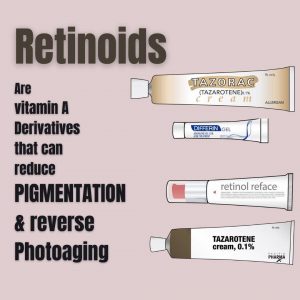
Retinoids are the most powerful anti-wrinkle topical ingredient to date. They reduce wrinkles by stimulating dermal collagen, increasing turnover of skin cells (exfoliation) & improving skin lumosity.
The buzz word to look out for is retinol. This molecule is powerful, yet gentle enough for most skin types. Other retinoids include retinaldehyde, retinyl palmitate & hydroxy pinacolone retinoate. Prescription retinoids include tretinoin, retinoic acid, adapalene, tazoretene & trifarotene. This group is more powerful than OTC formulations.
What are alpha hydroxy acids?

This group of skin acids include lactic, citric, glycolic, & mandelic acids. They reduce wrinkles by –
- Stimulating dermal collagen. Especially in high concentrations ranging between 50-70% glycolic acid (in clinic peel).
- Improving epidermal turnover (exfoliation role), hence reduces the appearance of fine lines and wrinkles.
- Increasing the absorption of more potent skin care products such as retinoids. In this role they act as primers.
OTC AHA lotions & serums range between 8-20% AHA in a pH range of 2.5 to 3.8. The best formulations will depend on your skin type, conditions, current ingredients & end goals.
Disclaimer: For product recommendations, please see my clinical team. I do NOT provide skin consults as my work is procedural.

View our Treatment Gallery
Why are antioxidants important?
These groups of molecules are the second line of defence after sun protection. They help reduce free radical breakdown of collagen, in turn preventing wrinkles. They should be employed in your morning routine. Antioxidants include ascorbic & ferulic acids, tocopherol & silymarin.
What is the role of hyaluronic acid in treating wrinkles?
Hyaluronic acid is a powerful humectant. It can be used on your skin, as a moisturiser or preferably injected as a skin hydrating treatment .
Hyaluronic acid in skin care can improve mild wrinkles by hydration of the epidermal layer. HA of varying molecular weights penetrate to different depths, drawing in environmental water. In a higher humidity environment, water goes into the skin. Conversely in low humidity, large molecular weight HA can draw water from the deeper layers of skin. Finding which HA is best for your skin type is important.
Disclaimer: I only prescribed HAs for procedures, namely hydrating treatments. For product recommendations, please see my clinical team.
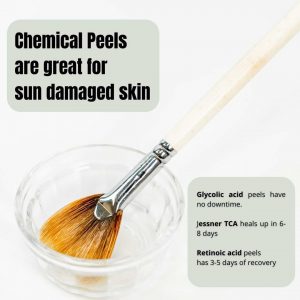
How does vitamin C reduce wrinkles?
Vitamin C or ascorbic acid can reduce wrinkles by-
- Stimulation of dermal collagen.
- Reducing collagen damaging free radicals from UV & environmental pollutants.
- Improving the light reflex & hence luminosity of skin by reducing pigmentation
Look for formulations ranging from 10% to 20% L-ascorbic acid. Formulations matter. Vitamin C is not the best if you have sensitive skin (eg. Rosacea).
How to optimise your procedure outcomes with anti-wrinkle skin care?
So, you have spent time, effort & money on lasers, peels, & cosmetic injectables, it is a waste not to maintain it. Simple yet directed skin care can optimise & preserve the results.
Choosing the right ingredients and the correct time to start is paramount. For example, retinoids should not be used too early following laser resurfacing procedures. In some cases, retinoids are introduced 10 days post laser, in other cases 3-6 months. If you have sensitive skin, you will be better off with niacinamide. Be guided by your skincare expert.
Disclaimer: My work is entirely procedural, for product recommendations, please see my clinical team.
Can collagen supplements be useful?
Collagen supplementation with aminoglycans can be useful for joint health. There are no great studies on how they can help with skin health & wrinkles. Nevertheless, they are safe & cost effective.
What is the role of sunscreen, & which one to use?
Wrinkles can be caused by intrinsic aging or natural chronological ageing as well as extrinsic ageing. UV accounts for 95% of extrinsic aging (smoking, pollution & oxidation accounts for the rest). UVA gives wrinkles, UVB gives skin cancer & sunburn.
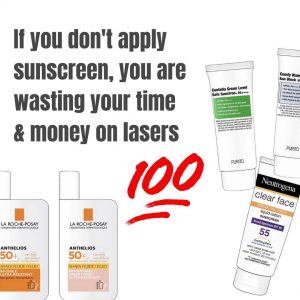
In Australia, the vast majority of sunscreens protect against both spectrums, hence the term broad spectrum. My recommendations include La Roche Posay Anthelios, Skinceuticals, Melan 130, Neutrogena & Ego brands. Just use it.
Are more expensive anti-wrinkle creams better?
Nope, some cheap brands like The Ordinary (cheap & in some cases nasty), make good cleansers including squalene & their skin care acids.
Some higher end brands like Drunk Elephant make expensive but powerful products, think of their combination of AHAs/BHA such as T.L.C, pH 3.5 formulation. Whilst other brands such as La Mer provide great feeling creams with very little science.
What are my unbiased opinions as to brands that I rate?
There are literally thousands of brands, however I will share some insight as to the brands I know & like.
For combination skin & dry skin, I like Murad. They have a gentle, rich & creamy texture for their retinol & ascorbic acid range. This is my personal retinol of choice in winter.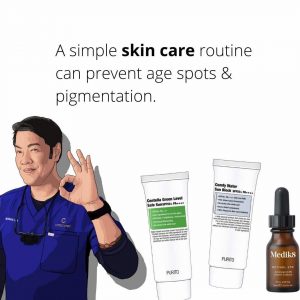
For antioxidants, the standout brand is Skinceuticals with their CE Ferulic acid. They also make a good hyaluronic acid serum.
Sunscreens? I like La Roche Posay, Melan 130 as well as Neutrogena or even Banana Boat for ‘active wear.’
What are natural ways to reduce wrinkles?
If you are into natural ways to reduce wrinkles, your best resource is a naturopath or a holistic healing gypsy. Organic ingredients include argan oil (proven anti-wrinkle ingredient, & anti-oxidant), vitamin C, green tea, vitamin E, as well as fruit acids derived from sugar cane (glycolic acid), citrus fruits (citric acid), or bathe in sour milk (lactic acid).
The two most powerful natural ingredients for wrinkles are of course- the purified protein from clostridium bacteria, & the by-product of sterilised streptococcus bacteria. I use these ingredients daily to inject & correct deep wrinkles & lines.
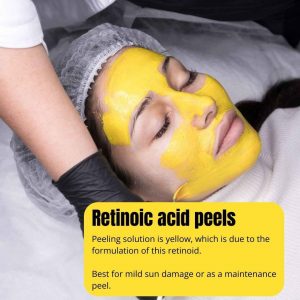
Who to see?
Book an appointment with my clinical team. They will go through your skin type, sensitives, & goals. They will then formulate a treatment plan using the best products from Skinceuticals, Obagi, The Formulated, Murad, Synergie, Medik 8, Aspect Dr & more.
Disclaimer: I do not do skin care consultations. My work is procedural only- I cut, laser, peel & inject.
What does a sensible, effective & cost-effective anti-wrinkle program look like?
An effective anti-wrinkle strategy is to combine procedures (that work) & topicals. It looks something like this-
- Low joule high density CO2 fractional laser with retinoic acid infusion, 1-2 times a year.
- AM: Ascorbic acid +/- Ferulic acid, Tocopherol
- PM: Retinol 1%
- The above is as simple as it gets, you can add Botox & hydrating treatments as you see fit.

Simple 1927 lasers can markedly improve pigment, wrinkles & age related changes.
Davin’s viewpoint on anti-wrinkle creams
If I can give you some advice- be purposeful & directed with your skin care if you want results. Skin care can be ritualistic, namely a 10 to 20 step routine. Nothing wrong with this if you have too much time on your hands and or like this routine. Koreans do it, it makes skin care fun.
My view is minimalistic. It may not be the view shared by others, & I respect that. In any given situation (bar pigmentation due to melasma), skin directed procedures such as hydrating treatments, Botox, clinical peels, laser resurfacing etc.. are going to give you better results over skin care. The flipside, skin care can preserve the results you get from procedures. In the ideal world, powerful ingredients used intermittently (& with purpose) give the best results. There are many other factors to consider including-
- Product knowledge of the patient. Do they know how to safely combine?
- Skin irritation threshold of the individual, this varies. A lot.
- Access to retinoids & powerful AHAs.
- Guidance as to the ideal combination & percentages.
My hint, start slowly, understand our skin. Know when to push & when to back off. If you are using super powerful actives, know how to salvage irritant dermatitis.

